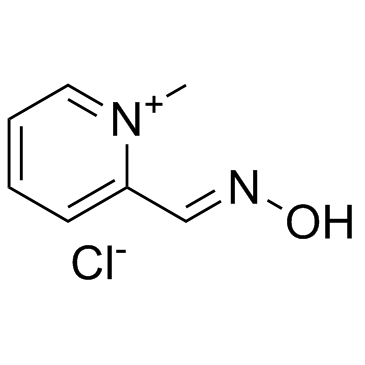氯解磷定

氯解磷定结构式

|
常用名 | 氯解磷定 | 英文名 | 2-Pyridinealdoxime methochloride |
|---|---|---|---|---|
| CAS号 | 51-15-0 | 分子量 | 172.612 | |
| 密度 | N/A | 沸点 | 189.7ºC at760mmHg | |
| 分子式 | C7H9ClN2O | 熔点 | 215-225 ºC | |
| MSDS | 中文版 美版 | 闪点 | 68.5ºC | |
| 符号 |

GHS07 |
信号词 | Warning |
|
Development and validation of a FIA/UV-vis method for pK(a) determination of oxime based acetylcholinesterase reactivators.
J. Pharm. Biomed. Anal. 117 , 240-6, (2015) Acetylcholinesterase reactivators (oximes) are compounds used for antidotal treatment in case of organophosphorus poisoning. The dissociation constants (pK(a1)) of ten standard or promising acetylcholinesterase reactivators were determined by ultraviolet abso... |
|
|
An in vivo zebrafish screen identifies organophosphate antidotes with diverse mechanisms of action.
J. Biomol. Screen. 18(1) , 108-15, (2013) Organophosphates are a class of highly toxic chemicals that includes many pesticides and chemical weapons. Exposure to organophosphates, either through accidents or acts of terrorism, poses a significant risk to human health and safety. Existing antidotes, in... |
|
|
Chlorpyrifos is associated with slower serum cholinesterase recovery in acute organophosphate-poisoned patients.
Clin. Toxicol. (Phila.) 51(5) , 402-8, (2013) Organophosphate poisoning (OPP) accounts for 200,000 deaths annually in developing countries. Serum cholinesterase (SChE) is of diagnostic value in patients with OPP and is checked repeatedly during the course of treatment. This study aimed to investigate the... |
|
|
Effect of different oximes on rat and human cholinesterases inhibited by methamidophos: a comparative in vitro and in silico study.
Basic Clin Pharmacol Toxicol. 111(6) , 362-70, (2012) Methamidophos is one of the most toxic organophosphorus (OP) compounds. It acts via phosphorylation of a serine residue in the active site of acetylcholinesterase (AChE) and butyrylcholinesterase (BChE), leading to enzyme inactivation. Different oximes have b... |
|
|
Phase II study of magnesium sulfate in acute organophosphate pesticide poisoning.
Clin. Toxicol. (Phila.) 51(1) , 35-40, (2013) Acute organophosphorus (OP) poisoning is relatively common and a major cause of death from poisoning in developing countries. Magnesium has been shown to be of benefit in animal models.We conducted a phase II study of bolus doses of (MgSO4) in 50 patients wit... |
|
|
Recurrent neonatal organophoshorus poisoning.
Indian Pediatr. 49(9) , 752-3, (2012) Organophosphorus poisoning in neonates is extremely rare and needs high index of suspicion to diagnose it. The clinical presentation is often confused with the features of sepsis like apnea, copious oral secretions, diarrhea, letharginess, seizures. There may... |
|
|
Investigation of kinetic interactions between approved oximes and human acetylcholinesterase inhibited by pesticide carbamates.
Chem. Biol. Interact. 206(3) , 569-72, (2013) Carbamates are widely used for pest control and act primarily by inhibition of insect and mammalian acetylcholinesterase (AChE). Accidental or intentional uptake of carbamates may result in typical signs and symptoms of cholinergic overstimulation which canno... |
|
|
A retrospective analysis of acute organophosphorus poisoning cases admitted to the tertiary care teaching hospital in South India.
Ann. Afr. Med. 13(2) , 71-5, (2014) We have herein reported our experience with the pattern of presentation of cases of acute organophosphorus (OP) poisoning cases in a tertiary care hospital.This retrospective study evaluated the hospital records of patients with acute OP poisoning. In a pre-s... |
|
|
Body mass index as a prognostic factor in organophosphate-poisoned patients.
Am. J. Emerg. Med. 32(7) , 693-6, (2014) Organophosphate poisoning is a serious clinical entity and considerable morbidity and mortality. Several factors have been identified to predict outcomes of organophosphate poisoning. Organophosphates are lipophilic and therefore predicted to have a large vol... |
|
|
Repeated pulse intramuscular injection of pralidoxime chloride in severe acute organophosphorus pesticide poisoning.
Am. J. Emerg. Med. 31(6) , 946-9, (2013) This study aimed to clarify the efficacy of 2 therapies for patients with severe acute organophosphorus pesticide poisoning, including atropine adverse effects, the length of intensive care unit (ICU) stay, complications, and mortality.A retrospective cohort ... |